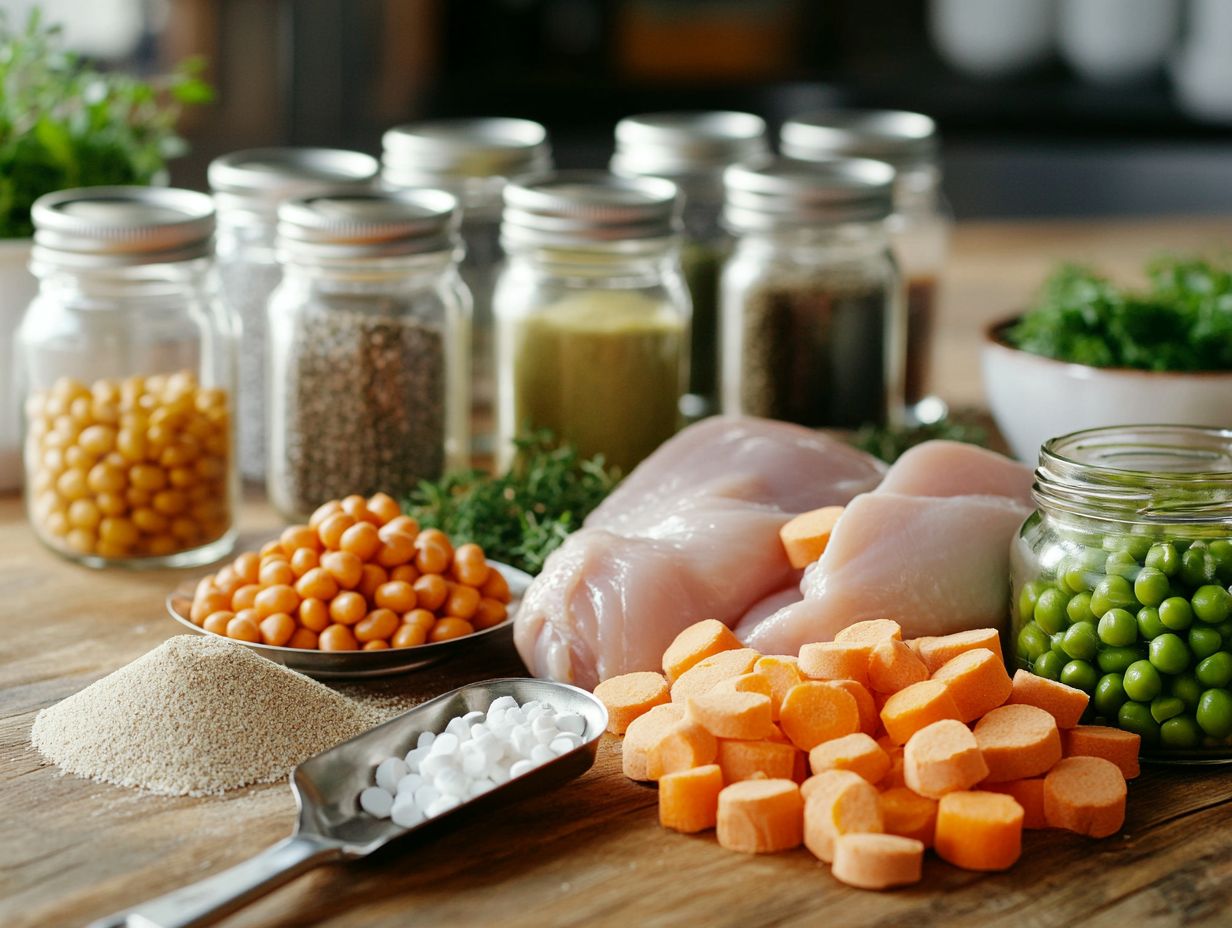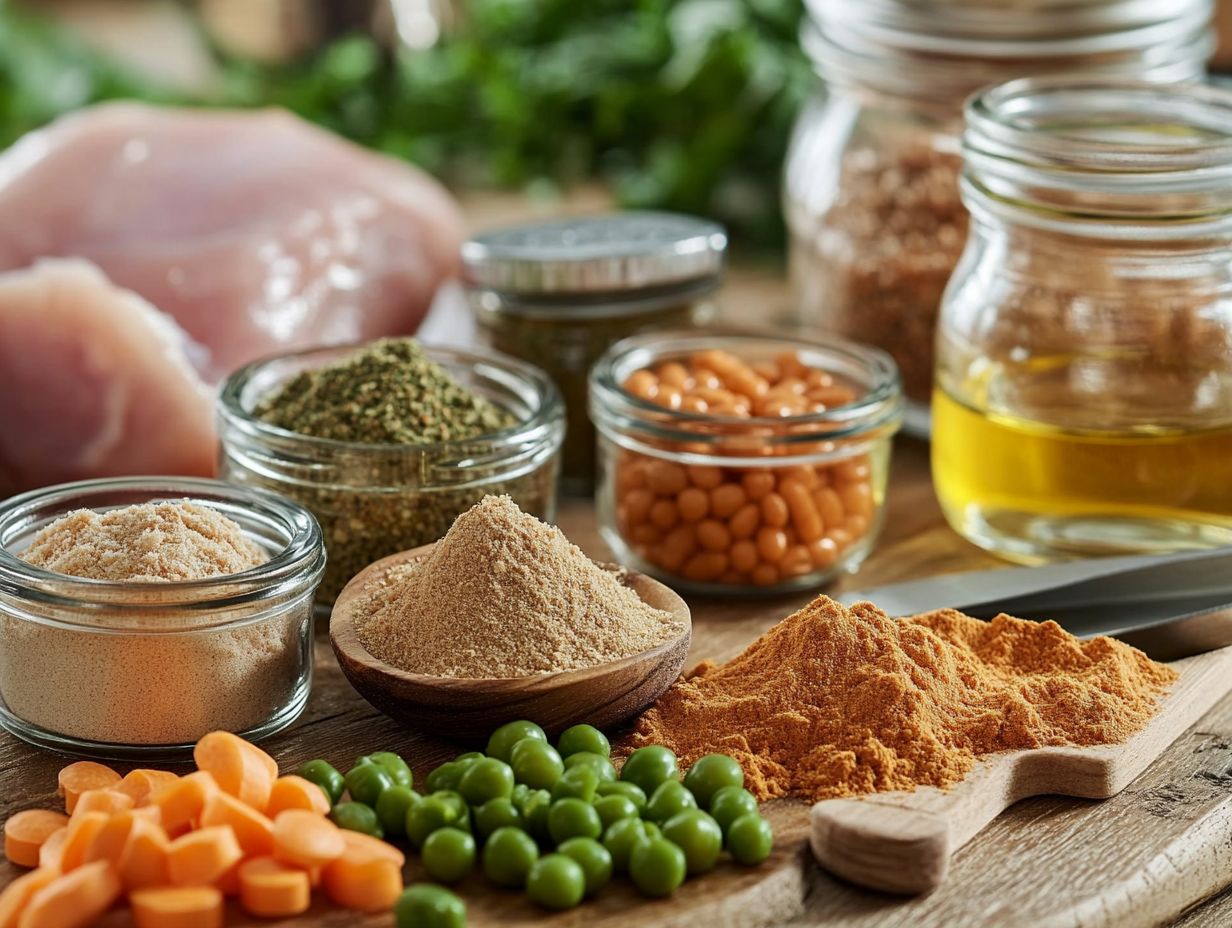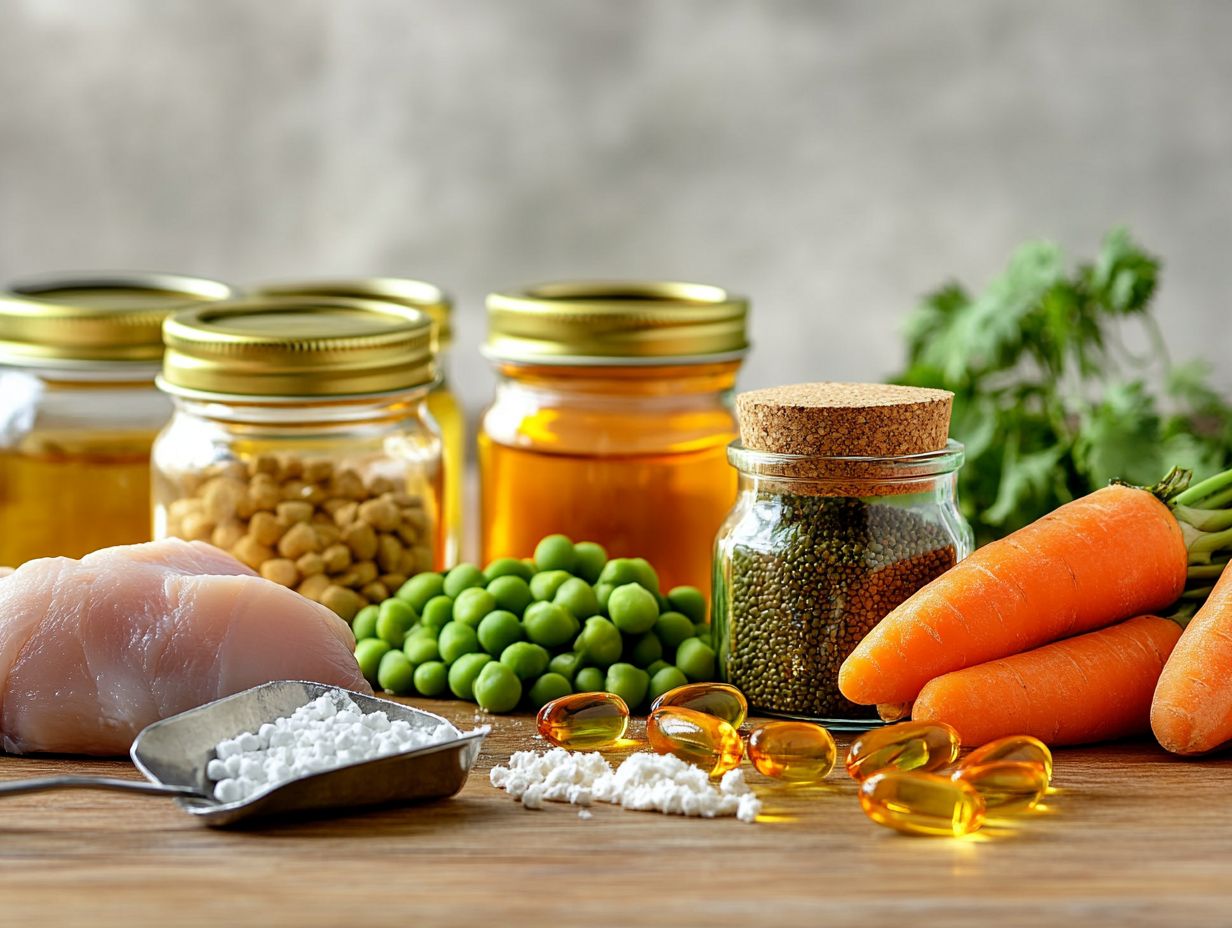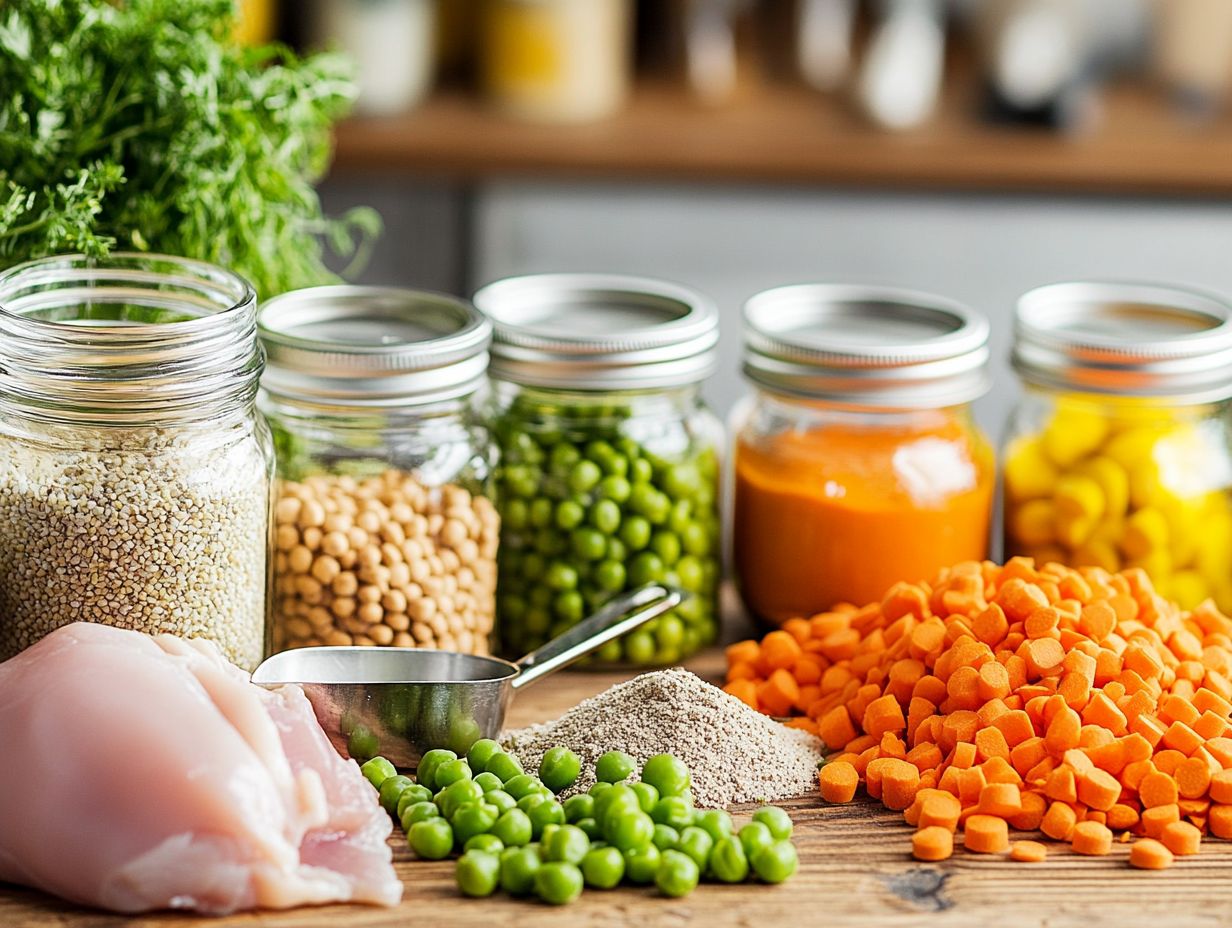Disclaimer: Before transitioning your cat to a homemade diet, it is essential to consult a veterinarian to ensure that the diet meets your cat’s specific nutritional needs and complies with veterinary nutrition standards.
Creating homemade cat food can be a rewarding way to ensure your feline friend receives a balanced and nutritious diet tailored to their specific needs, whether you choose a raw diet or cooked meat approach. However, it is crucial to be aware of the potential risks associated with homemade cat food, particularly concerning nutrient deficiencies. A balanced diet is essential, especially when considering raw diets.
It’s crucial to understand the essential supplements that can enhance the nutritional value of your recipes. From taurine to vitamins and minerals, the right additions, including meal completers like Vit’i5 Orange (a supplement designed to provide essential nutrients to homemade diets) or Felini Complete (a complete nutrient mix for homemade meals), can make all the difference.
This guide will help you understand the importance of these supplements and how to balance nutrition effectively, ensuring your cat thrives on their homemade meals through proper feeding guidelines and nutritional analysis.
Key Takeaways:

Why is Homemade Cat Food Important?
Homemade cat food enables pet owners to offer their cats a balanced diet tailored to their specific nutritional needs. Unlike commercial cat foods, which may contain fillers and lack essential nutrients, homemade diets provide a personalized approach that ensures optimal nutrient levels using trusted ingredients.
Preparing homemade cat food also educates caregivers about nutrition and enhances their nutritional knowledge, highlighting the crucial roles of animal proteins, vitamins, and minerals in supporting the growth and well-being of their cats. As obligate carnivores, cats have unique dietary needs that must be met primarily through animal-source proteins.
What are the Essential Supplements for Homemade Cat Food?
Essential supplements are added to homemade cat food to enhance its nutritional content and ensure it meets any missing dietary requirements for a balanced diet. When preparing homemade meals, it is crucial to include supplements such as taurine and calcium, as these are vital for a cat’s health.
Additionally, vitamins D and B12, omega-3 fatty acids, and zinc are important for supporting specific bodily functions, helping to create a diet tailored to the individual needs of the feline. It is important to clarify recommended dosages: for taurine, a common dosage is around 250-500 mg per day, while calcium requirements are approximately 0.5 to 1.0 grams per day depending on age and activity level.
1. Taurine
Taurine is an essential amino acid crucial for feline nutrition, playing a significant role in maintaining heart health, vision, and reproductive functions. Unlike many other animals, cats cannot synthesize taurine in sufficient amounts, making its inclusion in homemade cat food vital to prevent deficiencies that could lead to serious health issues.
Due to the unique metabolic needs of felines, taurine must be obtained through their diet, primarily from animal-based proteins such as meat and fish. This compound is essential for the proper functioning of various bodily systems, promoting overall well-being and vitality. Safe supplementation practices include using taurine powder mixed into meals.
If a cat’s diet lacks adequate taurine, it may face numerous health risks, including dilated cardiomyopathy (a serious heart disease), vision problems, and reproductive complications. Therefore, ensuring sufficient taurine levels is essential for sustaining a cat’s health and longevity, highlighting the importance of balanced nutrition tailored to their specific needs.
2. Calcium
Calcium is an essential mineral for cats, crucial for the healthy development of bones, teeth, and muscles. Maintaining the correct levels of calcium in homemade cat food helps prevent bone fractures and dental issues, making it a vital component of a balanced diet.
A cat requires approximately 0.5 to 1.0 grams of calcium per day, depending on its age and activity level. To meet these recommended amounts, high-quality sources of calcium are necessary. Options such as ground eggshells, which are rich in calcium carbonate, and certain types of fish like sardines are excellent choices. Organ meats, particularly liver, also provide calcium along with other essential nutrients.
By properly balancing these ingredients, cat owners can prepare well-rounded meals that meet their pets’ calcium needs, contributing to healthier and happier lives for their cats.
3. Vitamin D
Vitamin D is an essential nutrient for cats, crucial for calcium absorption and maintaining bone health. Insufficient vitamin D in homemade cat food can lead to calcium deficiency, resulting in weakened bones and other serious health issues.
Proper Storage of Homemade Cat Food
To prevent spoilage, homemade cat food should be stored in airtight containers in the refrigerator, ideally below 40°F (4°C). Any unused portions should be consumed within 3-4 days or can be frozen for up to 3 months. Signs of spoilage include an off smell, discoloration, or mold. Always discard any food that shows these signs.
Current Guidelines on Homemade Diets
It is important to follow the most recent guidelines from the Association of American Feed Control Officials (AAFCO) and the World Small Animal Veterinary Association (WSAVA) regarding homemade diets to ensure they are safe and nutritionally complete.
Special Dietary Considerations
Different life stages such as kittens, senior cats, and pregnant or nursing cats have unique nutritional requirements. Consult with your veterinarian to develop a homemade diet that meets the specific needs of your cat at its current life stage.
Transitioning to Homemade Food
When transitioning your cat to homemade food, it’s important to make gradual changes to prevent digestive upset. Start by mixing a small amount of homemade food with their regular food, gradually increasing the proportion of homemade food over a period of at least one week.
Disclaimer: Before making any significant dietary changes for your cat, especially regarding homemade diets, it is crucial to consult with a veterinarian.
Cats are obligate carnivores, meaning they require animal-source proteins to meet their nutritional needs. This dietary requirement is essential for obtaining vital nutrients such as vitamin D, vitamin B12, and omega-3 fatty acids, all of which are critical for their health and well-being.
This nutrient also plays a vital role in facilitating various bodily processes, including immune function and cell growth, highlighting the importance of ensuring cats receive adequate amounts. However, it’s important to note that cats may not efficiently synthesize vitamin D from sunlight, especially if they are primarily indoors, and therefore require dietary sources.
Natural sources of vitamin D for cats include fatty fish such as salmon and sardines, fish liver oil, and certain types of eggs. Incorporating these foods into a cat’s diet can help ensure they receive sufficient vitamin D, but it is essential that these foods are part of a balanced diet that meets all nutritional needs.
Consulting with a veterinarian or pet nutrition expert can provide guidance on how to best achieve this.
4. Vitamin B12

Vitamin B12 is crucial for a cat’s energy metabolism and neurological functions, making it an important supplement in homemade cat food. A deficiency in this vitamin can lead to anemia and neurological issues, highlighting its significance in a cat’s diet. The recommended dietary allowance for vitamin B12 in cats is approximately 0.02 mg/kg of body weight.
Vitamin B12 plays a vital role in the formation of red blood cells and the proper functioning of the nervous system, both of which are essential for optimal health. Regular veterinary check-ups are also important to monitor nutrient levels.
Common sources of vitamin B12 include animal products such as meat, fish, and dairy, meaning that homemade cat food typically contains some of this vitamin. However, when preparing a meal at home, it is essential to ensure that vitamin B12 is added if it hasn’t already been included, as meeting all of a cat’s dietary needs requires careful planning.
By incorporating this essential vitamin, cat owners can help ensure their cat’s well-being, vitality, and longevity.
5. Omega-3 Fatty Acids
Omega-3 fatty acids are essential for maintaining healthy skin and coat, as well as promoting heart and joint health in cats. Incorporating omega-3s into homemade cat food—using ingredients like fish oil or flaxseed—can help create a balanced diet that meets a cat’s specific nutritional needs, ensuring the right omega-3 ratio. However, it’s crucial to adhere to recommended dosages when using supplements like fish oil to avoid potential risks of over-supplementation.
These fatty acids play a significant role in reducing inflammation, which can be particularly beneficial for older cats or those suffering from arthritis. Additionally, omega-3s support cognitive function, which is vital for preserving mental sharpness throughout a cat’s life.
By choosing high-quality sources such as sardines or chia seeds, cat owners can ensure their pets enjoy both delicious flavors and the numerous health benefits associated with these nutritional powerhouses. Ultimately, the right proportion of omega-3s can contribute to a happier and healthier feline companion.
6. Vitamin E
Vitamin E is an antioxidant that protects cells from damage and plays a vital role in maintaining a healthy immune system in cats. Its inclusion in homemade cat food is essential for ensuring overall health and preventing disorders related to nutrient deficiencies. A deficiency in vitamin E can lead to muscle degeneration and reproductive issues, while excess can cause blood clotting problems.
As an essential nutrient, all cats require appropriate amounts of vitamin E as part of a balanced diet. Cats can obtain vitamin E from sources such as spinach, nuts, and fish oil, which can easily be incorporated into homemade diets. Providing small amounts of these ingredients can help ensure that cats receive sufficient vitamin E.
Owners may want to consult a veterinarian for personalized dietary guidelines to maintain an overall balance of nutrients. Consistently including vitamin E-rich foods in a cat’s diet can lead to noticeable improvements in its energy levels and overall well-being.
7. Zinc
Zinc is an essential trace mineral that plays a vital role in immune function and skin health in cats. Ensuring that homemade cat food contains adequate levels of zinc can help prevent deficiencies that may lead to skin problems and impaired healing. Signs of zinc deficiency in cats may include skin lesions or poor coat quality.
This important mineral is involved in various biochemical processes, including enzyme function and cellular metabolism. Natural sources of zinc for cats include meats such as chicken, beef, and fish, as well as certain types of seafood.
Experts recommend that a feline diet should provide around 120-150 mg of zinc per kilogram of food to maintain optimal levels. Insufficient zinc intake can result in a range of health issues, including a compromised immune response, poor coat quality, and lethargy.
Therefore, it is crucial for cat owners to ensure that their pets receive balanced nutrition to promote overall well-being.
8. Iron
Proper food storage practices are essential to prevent spoilage and ensure that nutrients remain intact. Homemade cat food should be stored in airtight containers in a cool, dry place, and any leftover food should be refrigerated and consumed within a few days.
Ethical considerations of sourcing animal products for homemade diets should also be taken into account. Owners are encouraged to choose sustainably sourced ingredients to promote environmental responsibility.
Iron is an essential mineral for producing hemoglobin, which carries oxygen in the blood. It is crucial to include adequate levels of iron in homemade cat food to support physiological health. According to AAFCO guidelines, the recommended dietary allowance for iron in adult cats is approximately 80 mg/kg of dry matter. Insufficient iron can lead to fatigue, a weakened immune system, and anemia, resulting in serious health consequences. Pet owners who prepare food for their cats at home should incorporate a variety of iron-rich animal ingredients into their diet, as cats are obligate carnivores who require animal-source proteins for optimal iron absorption.
Ingredients such as liver, lean meats, and certain types of fish provide iron in a form that cats can easily absorb. It is important to note that while liver is a rich source of iron, it should be included in moderation due to the risk of vitamin A toxicity. Additionally, while dark leafy greens can be included to enhance dietary iron content, they should not be solely relied upon, as plant-based iron is less readily absorbed by felines.
By mixing these ingredients in appropriate ratios and consulting with a veterinarian, owners can ensure that their cats receive sufficient iron and maintain optimal health while avoiding potential nutrient imbalances or deficiencies.
How to Balance Nutrition in Homemade Cat Food?
Ensuring balanced nutrition in homemade cat food is essential for providing pets with all the nutrients they need to thrive. Following proper feeding guidelines and consulting with a veterinary nutritionist is essential when introducing homemade diets. This can assist pet owners in creating a complete diet tailored to their cat’s individual needs.
A nutrient calculator can be utilized to determine the nutritional composition of the meal, helping to ensure that the necessary omega-3 ratios, vitamins, and minerals are included for optimal health, including critical nutrients such as taurine and arachidonic acid.
1. Consult a Veterinarian

While researching and seeking expert advice are essential for understanding your cat’s dietary needs, the best general recommendation is to consult a veterinarian when transitioning to homemade cat food or when your cat’s health or nutritional requirements change. Veterinary consultation is essential for nutrition safety, especially when addressing special dietary needs arising due to health issues or age.
Veterinarians and veterinary nutritionists have access to consultation tools and professional resources that can help determine the safest and most nutritious homemade diets for cats. For example, cats with kidney problems may require diets with lower protein content, while those with allergies or food intolerances may need to avoid specific ingredients.
Additionally, professional guidance is crucial for nutrient analysis to ensure that homemade diets provide adequate vitamins, minerals, and fats, thus preventing common deficiencies. By consulting with a veterinarian, cat owners can minimize the risk of missing or over-supplying essential nutrients and ensure their pets receive a balanced diet, contributing to better overall health and longevity.
2. Use a Nutrient Calculator
A nutrient calculator is an invaluable tool for analyzing the nutritional profiles of home-cooked cat food. It enables owners to determine whether their recipes meet the minimum nutritional requirements set by AAFCO and FEDIAF.
By evaluating their recipes for appropriate levels of proteins, fats, vitamins, and minerals, owners can ensure balanced nutrition for their cats. By inputting the various ingredients and their respective amounts, they can quickly identify any essential nutrients that may be missing or present in excessive amounts that could jeopardize their cat’s health.
For instance, taurine and omega fatty acids are particularly important for cats compared to other animals. With this information, owners can make necessary adjustments to their recipes, ensuring a diverse array of nutrients in the right proportions and providing their cats with a holistic, balanced meal.
Regular use of a nutrient calculator can enhance a cat’s physical well-being while also engaging pet owners who are passionate about their cat’s nutrition.
3. Rotate Protein Sources
The importance of rotating protein sources in homemade cat food lies in the fact that a variety of animal proteins provides a broader range of nutrients and helps to prevent potential food sensitivities. By rotating chicken, fish, and beef, pet owners can create a balanced diet that caters to the unique needs of each cat.
4. Safe Storage and Handling
Careful storage and handling of homemade cat food are crucial to prevent spoilage and bacterial contamination. Store food in airtight containers in the refrigerator and consume it within a few days. Signs of spoilage include unusual odors, discoloration, or mold.
5. Ethical Sourcing of Ingredients
When sourcing ingredients for homemade cat food, it is important to consider ethical and sustainability aspects. While the health of the cat must remain the priority, choosing responsibly sourced animal proteins can contribute to more sustainable practices.
6. Special Considerations for Different Life Stages
Different life stages, such as for kittens, pregnant/nursing cats, and senior cats, have unique nutritional needs that must be addressed in homemade diets. Consulting with a veterinarian can help ensure that the specific requirements for these life stages are met.
This practice minimizes the risk of overexposure to allergens and ensures that essential amino acids, vitamins, and minerals are present in adequate amounts in the cat’s diet. It is crucial to prioritize animal-source proteins, like chicken and fish, as primary components, while incorporating other protein sources, such as turkey and lamb, can optimize digestion and enhance overall health. However, consult a veterinarian before rotating protein sources, as some cats may develop food sensitivities.
Additionally, rotating protein sources can increase a cat’s appetite, as they may lose interest in the same flavor over time. This approach encourages pet owners to consider whole food ingredients rather than processed options, fostering a more mindful perspective on nutrition.
Ultimately, including multiple protein sources contributes to a more varied and colorful diet, promoting the cat’s long-term health and well-being.
4. Incorporate Safe Vegetables in Moderation
Incorporating various safe vegetables into homemade cat food can help meet the nutritional needs of cats, as they provide essential vitamins, minerals, and fiber crucial for a healthy digestive system. While small amounts of safe vegetables can be included, it’s important to note that the majority of a cat’s diet should consist of animal protein, and not all vegetables are safe for cats. Veterinarians often recommend vegetables such as cooked carrots, peas, and pumpkin for their beneficial nutrients and relatively mild effects on feline digestion.
Carrots contain beta-carotene, which promotes and maintains good eye health, while peas offer protein and fiber that aid in digestion. Pumpkin is also beneficial for cats, particularly for its ability to regulate bowel movements.
While there is some debate regarding the necessity of adding vegetables to a cat’s diet, it is essential to puree or finely chop the vegetables to ensure they are digestible and to cook them well to avoid gastrointestinal upset. Veterinarians advise starting with a very small amount and gradually increasing the quantity added to meals. This approach allows cats to adjust to the new flavors while still receiving their essential protein.
5. Add Supplements as Needed
Incorporating necessary supplements is essential for ensuring that homemade cat food meets the proper nutrient levels for optimal feline health. Key nutrients, such as taurine, are critical for heart health and vision, and deficiencies can lead to serious health issues. Regularly reviewing the diet’s nutritional profile and collaborating with a veterinary nutritionist can help identify any nutritional deficiencies that may need to be addressed with supplements. It’s also important to ensure that homemade diets are AAFCO-compliant to avoid nutritional gaps.
This process requires an understanding of cats’ nutritional needs, which can vary based on age, health status, and activity levels, as well as awareness of potential deficiencies associated with homemade diets. Additionally, regularly assessing the cat’s behavior and coat condition can serve as valuable indicators of overall well-being and nutritional adequacy.
It is important to note the risks associated with feeding raw diets, including the potential for bacterial contamination. Always consult with a veterinary professional when considering such diets. Ultimately, a careful evaluation of dietary requirements enables appropriate adjustments to food preparation methods or the addition of supplements, ensuring that cats receive a balanced diet that promotes a long and healthy life.
For safe food handling, homemade food should be kept refrigerated, and pet owners should be aware of signs of spoilage to ensure their cat’s safety.
Frequently Asked Questions
What are essential supplements for homemade cat food?

Essential supplements for homemade cat food are additional nutrients that are not naturally found in homemade cat food but are necessary for a balanced and nutritious diet.
Why are essential supplements important for homemade cat food?
Homemade cat food is often lacking in certain nutrients, making it important to add essential supplements to ensure your cat is receiving a balanced and complete diet.
What are some examples of essential supplements for homemade cat food?
Examples of essential supplements for homemade cat food include taurine, calcium, vitamins, and minerals.
How can I know which essential supplements to add to my cat’s homemade food?
You can consult with a veterinarian or a feline nutritionist to determine the specific essential supplements that your cat may need based on their age, health, and any dietary restrictions.
Can I add too many essential supplements to my cat’s homemade food?
Yes, it is possible to add too many essential supplements to your cat’s homemade food. It is important to follow recommended dosage guidelines and consult with a professional before adding any supplements to your cat’s diet.
Are there any potential risks to giving my cat essential supplements in their homemade food?
Overdosing on certain supplements can lead to health issues, which is why it’s crucial to prioritize evidence-based information and adhere to veterinary standards and guidelines when considering any adjustments to your cat’s diet.
In some cases, giving your cat too much of certain essential supplements can lead to toxicity. Common supplements include taurine, which is vital for heart function, omega-3 fatty acids for skin and coat health, and vitamin E as an antioxidant. However, over-supplementation of these can cause serious health issues, such as heart conditions or gastrointestinal upset. It is important to carefully research and follow recommended dosage guidelines when adding supplements to your cat’s homemade food.
Before introducing any supplements, it is crucial to consult with a veterinarian. They can provide tailored advice based on your cat’s individual health conditions and dietary needs, ensuring the supplements are appropriate and safe.
For those interested in homemade cat food, consider recipes like chicken and pumpkin stew or salmon and sweet potato mash. These can include supplements such as fish oil or taurine, but be sure to measure carefully to avoid over-supplementation.
Be aware of the signs of toxicity which may include vomiting, diarrhea, lethargy, or more severe symptoms depending on the supplement involved. For instance, excessive vitamin A can lead to bone deformities, while too much calcium may result in kidney issues.
Lastly, it is essential to adhere to AAFCO (Association of American Feed Control Officials) standards when formulating homemade diets, ensuring that the overall nutrient profile meets the dietary needs of cats. This will help prevent deficiencies and toxicities, promoting a healthy and balanced diet for your feline friend.